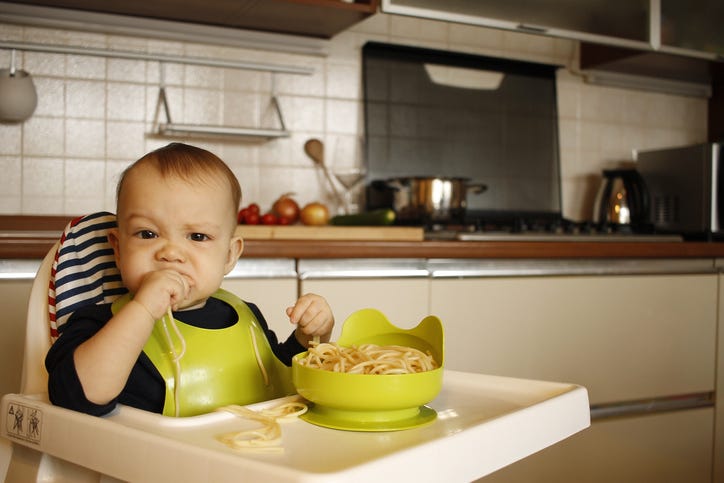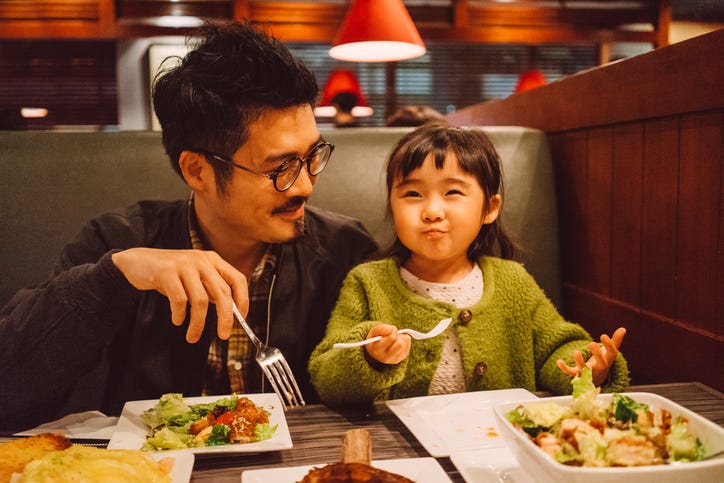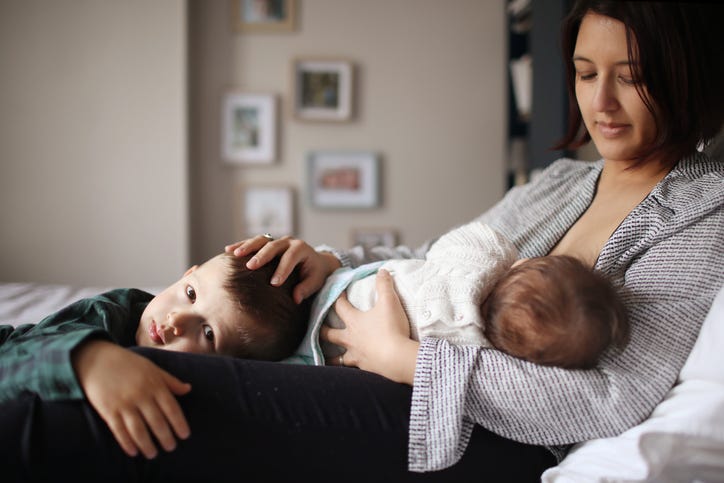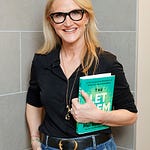Kids turn one and our expectations change. Suddenly, we want them to eat for nutrition and “food is fuel.”
You're listening to Burnt Toast! This is the podcast (and newsletter) about diet culture, fatphobia, parenting, and health.
As you are listening to this podcast today, I am also writing the last pages of my next book. It is called Fat Talk: Parenting in the Age of Diet Culture. It will be out next April. I'm recording this with still about 6,000 words ahead of me. I'm hoping by the time you're hearing this, it's like a thousand or five hundred words left. Or even none left! That would be great!
It's such a weird experience. I love writing books. I love being immersed in the research and the storytelling and the issues that I'm thinking about constantly. But I'm definitely also in the can-no-longer-see-the-forest-for-the-trees stage of this first draft. So, that is how I am feeling. Hopefully, by the time you're listening to this, it will be feeling much closer to relieved and celebratory!
Because I am swamped with getting this manuscript finished, I am giving you a couple of weeks of rerun episodes so I can stay firmly locked into book world and do a little less bouncing between book, newsletter, podcast, the way I have been for the last many months. So this week's rerun is a conversation that Amy Palanjian and I had on our old podcast Comfort Food, about emotional eating. This episode first aired on February 27, 2020. And I think it's one where we were actually a little ahead of our time because once Covid happened, the conversation around comfort eating changed. There was so much demonization of comfort eating and stress eating that we did see this really powerful backlash of folks saying, “No wait, actually we're going through a global trauma, making sourdough and enjoying it is a great way to cope with your anxiety.” A lot of that is what Amy and I are talking about in this episode.
We are longtime fans of comfort eating—that's why we named the podcast Comfort Food!—and of emotional eating as a benign coping strategy. It's something I continue to talk about: The importance of reclaiming these coping strategies for yourself, of removing the guilt and shame because that's what causes them to feel so harmful. A lot of what we talked about may not feel entirely new to you, if you've been following Burnt Toast for a while, but I do think we hit a lot of the key points really well. If you are struggling with feeling okay about feeding yourself in any way, it should be a really useful lesson.
If you enjoy this episode, please subscribe, rate and review us in your podcast player! It’s free and a great way to help more folks find the show.
And don’t forget! Today is your last day to fill out the reader survey and be entered in the Burnt Toast Book Giveaway!
It’s also your last chance to enter the giveaway by becoming a paid subscriber (or renewing an existing subscription if yours was set to expire this month). AND it’s the last day to take 20 percent off that subscription price!
PS. If you’ve already done the survey or gotten/renewed a subscription and aren’t sure you entered the giveaway, please fill out this form.
And keep sending in your questions for Virginia’s Office Hours! If you have a question about navigating diet culture and anti-fat bias that you’d like to talk through with me, or if you just want to rant about a shitty diet with me, you can submit your question/topic here. I’ll pick one person to join me on the bonus episode so we can hash it out together.

Virginia
Hello and welcome to episode 64 of Comfort Food! This is the podcast about the joys and meltdowns of feeding our families and feeding ourselves.
Amy
So this week we are going to explore the concept of emotional eating and some of the myths and misconceptions that can come up and also to talk about is it okay to eat when you're not physically hungry?
Virginia
I'm Virginia Sole-Smith, I'm a writer, a contributor to Parents Magazine and New York Times Parenting, and I'm the author of The Eating Instinct: Food, Culture, Body Image, and Guilt in America, which is out in paperback now and it has such a pretty new cover. Maybe I'll get Amy to put a picture in the show notes, you should definitely check it out. Anyway, I write about how women relate to food and our bodies in a culture that gives us so many unrealistic expectations about those things.
Amy
And I'm Amy Palanjian, a writer, recipe developer, and creator of Yummy Toddler Food. And I love helping parents to stop freaking out about what their kids will and won't eat and sharing doable recipes that fit into even the busiest family schedules.
Okay, so obviously, the name of our podcast is Comfort Food. So, we think that food should be comforting, but we realized we never explicitly talked about it in depth— about the concept of comfort as it relates to food and why we think it's important.
Virginia
Yeah. And it's a really fundamental to what we do. I mean, again, we named the podcast after it. I thought it would be fun to talk about some of the other names we went through. I really wanted to call the podcast Burnt Toast, which I still think is a great name. But we couldn't because there was one, even though it’s not around.
Amy
It's not a functioning podcast, but yeah.
Virginia
So anyway, if you're listening, and you were affiliated with the prior Burnt Toast podcast, you should give us your name. I mean, we're kind of already here. But Comfort Food felt like the perfect name. I think what we liked about Burnt Toast was that it was like the sort of imperfect, meal on the fly situation that a lot of us are in.
Amy
We went through a lot of iterations of something with pasta.
Virginia
I know, I really wanted to name it something with pasta. Basically, you can tell from all the foods we considered, we were about comfort food. So then it was like, okay, let's just group it all together into that umbrella.
Amy
Yeah. And you actually wanted to use that phrase in your book title, right?
Virginia
Yeah, my original title for The Eating Instinct was actually Comfort, Food. Now that feels dumb and a little twee—maybe that's why my agent vetoed it. But I thought that summed up what I was initially hoping to do with the book. My agent and the publisher liked The Eating Instinct better because it was a little more science-y sounding. Naming books is really hard.
The reason that I wanted it to be the book title is the book starts with Violet’s story. A really big turning point for us in helping Violet learn to become an oral eater was in the summer of 2016, when she was in and out of the hospital a ton. She had actually gotten off her feeding tube and become a really successful oral eater, and then she got very, very sick again and she stopped eating. I remember being in the ICU with her and these hospital dietitians and doctors swarming and obsessing over why she wasn't eating, what was going on. It was just so clear to me that eating had ceased to offer her any comfort so she had no incentive to do it. It felt like just another horrible thing happening to her body in this really intense medical situation. She didn't turn the corner again, until she found a way to make eating feel safe and comforting. That really opened my eyes to how, in this hospital setting, it doesn't work with a sick kid. They need food to be comforting—we all need that. We are so consistently making nutrition the enemy of comfort and the way we relate to food. So that was really what inspired the book and also a lot of the conversations that Amy and I have.

Amy
So much of what we hear about nutrition or the way that we're “supposed” to eat is looking at macros and doing it by grams. It's so devoid of any emotion, but that's not what it's like when you sit down at the table. You can't separate the two.
Virginia
I mean, it literally doesn't work without it. I think any of us who have successfully fed a baby, you intrinsically get why comfort matters. It is absolutely essential to a baby eating that they feel safe and comfortable. It's this really cozy, bonding, joyous experience to feed a baby, for both the parent and the child. But then suddenly, kids turn one and our expectations change and we want them to eat all these different foods, but now it's for “nutrition” and “food is fuel.” We want them to think of food as just this way to grow their bodies, but we're just much more anxious about comfort.
A lot of the research I did for the book really showed that we are biologically programmed to seek comfort in food. This is a feature, not a bug. We evolved to do it because human survival depends on us eating so often. We have to eat very regularly—and babies in particular have to eat, over and over and over again, all day long. If we didn't find it inherently pleasurable and comforting, we wouldn't do it. Especially generations ago, when food was scarce and it was hard to do. We need this, this is fundamental to the whole thing.
Amy Palanjian
So, last week Selway had his 12 month checkup and on the little paper that they gave us, it was like, “Your baby should be weaned off a bottle at this point.”
Virginia
Whoa. Whoa there.
Amy
Let's back up and look at like the emotional attachment that that baby might have.
For adults, it's been drilled into us that we are supposed to eat when we're hungry and stop when we're full. And if we eat for any other reason, then we're doing something wrong. We feel guilty and we've failed ourselves.
Virginia
Yeah, I think both Christy Harrison and Evelyn Tribole have talked about that in their episodes on the podcast. There's a misconception that when you talk about intuitive eating, you're talking about the hunger/fullness diet. I actually had a friend, a few months ago, we were out getting ice cream, and she was like, “Oh, I'd love to have that but I'm not hungry and I'm doing intuitive eating, so I'm not gonna eat the ice cream.” And I was like, “Oh, no. That's not what it means. It doesn't mean you only eat when you experience physical hunger.” You can also eat because we're out with our kids eating ice cream and we want to share that. That is this other piece of it. We are both of these things.
Amy
So we're going to run through a few common myths about comfort food and emotional eating.
Myth number one: Eating to comfort yourself is always bad.
Virginia
I mean, that's what people think, right? They think the cliche of having a pint of ice cream after a breakup or wanting cheesy crackers when you're stressed out is somehow this big failure. But eating something tasty to cheer yourself up after a hard day is totally normal. It's totally human. And it's also a totally fine coping strategy.
Amy
I have come to terms with the fact that I always need some sort of chocolate at the end of the day. It has nothing to do with like my overall nutritional intake. It just makes me feel better.
Virginia
Yeah. I mean, you have three children running around your house!
Amy
I made it to the end of the day, guys!
Virginia
You made it to bedtime, you need chocolate. Yeah, I struggled with this when we were in the hospital for so many months with Violet. Some people when they're undergoing extreme trauma totally lose their appetite and stop eating. I've had friends say to me, “This is really hard. People will praise this weight loss, but actually my life's falling apart. It’s not really for a good reason.” So, you know, that definitely happens. I do not respond to trauma that way. I respond to trauma by seeking comfort in food. I did a lot of comfort eating during those years of Violet being so sick. I had to really kind of come to terms with that. I struggled with it. Like, oh, I shouldn't be comfort eating. Then finally, I was like, “You know what? I am eating this chocolate croissant in a corner of an ICU hospital. This is what's getting me through the day. I am glad it is here for me.” There is nothing wrong with it. It's a form of taking care of yourself, for sure. It just gets such a bad rap.
Christy Harrison and I did an event for our books recently, and when we were doing the audience Q&A, a new mom raised her hand. She said, “You know, I really think I'm an emotional eater. Especially now that my baby's three months old, it just feels like I can't even have chocolate in the house because I can't stop eating it.” And we were both just like, of course you need chocolate, you are three months postpartum. You're not sleeping. Your life has been thrown up in the air. Give yourself this grace.
Amy
You're grasping at straws for something to sort of make you feel a little bit better in the moment. I have this lactation cookie, which I'm renaming to be just mama cookies, and it has chocolate in it purely because I know that having that thirty seconds of something that tastes good in your mouth is incredibly helpful when you're taking care of a small child. You're super, super tired and you just need that small window of pleasure.
Virginia
You literally can't get more sleep probably, that’s not available to you. Like, probably you wouldn't crave the chocolate quite as much if you were getting nine hours of sleep a night, but that's not going to happen for a long time. The solution is not to deprive yourself of this other thing, it's to meet what need you can. That’s a way to reframe it.
Amy
Myth number two: Feeling compulsive around food is the same as emotionally eating.
Virginia
This is interesting because people often label something as emotional eating when what they really mean is, it's hard for me to stop eating X. Like, If I have a bag of potato chips, I'm going to eat the whole bag. Or, if I see a plate of brownies, I'm going to need to eat the whole plate of brownies. They think that this means they're eating emotionally, when it may just mean that they feel restricted about that food. They've restricted it for so long, and now they can't anymore. That's why they're eating in that uncontrollable, scary-feeling way. This is a really big misconception about binge eating disorder, that it's somehow really different from anorexia or bulimia, these other eating disorders that are more obviously restriction-based. People think, binge eating disorder, those people just eat all the time, they can never stop. But all the new research on it is showing in around 40% of cases, it's a response to restriction. Somebody has been on a more restrictive plan, or diet, or full anorexia, and then it hits a brick wall and it goes the other way. Binge eating disorder is a whole complicated thing, we don't have to get into all of it, but a lot of cases are also people responding to growing up with intense food insecurity. Not having enough food in your house is also a form of restriction. It's kind of threaded throughout. I think it's important to understand that because we punish the symptom—eating in this uncontrollable way—without dealing what's really causing that. I think for a lot of us, even if you're not in an extreme place with it, that feeling of “I can't control myself around this food",” what you really need to ask is, why are you restricting this food? Why are you not able to give yourself permission to enjoy it when it's here?
Amy
Yeah, and I think if you've ever had a child who's been obsessed about one type of food, like goldfish, and then you buy goldfish and allow them to have them for snacks, you don't hide them or restrict them in any way, they lose a lot of their appeal. It becomes very clear that they weren't necessarily wanting to have them so badly because they love them so much, it was the feeling that they loved them and also they were not allowed to have them.
Virginia
Right. The love is not the problem, it was the restriction that was the problem. It's also worth noting, there's a difference between using food to comfort yourself in a tough situation or after a tough day, and using food as a way to escape or numb your emotions. That can become a more self destructive way to go, just like drinking to numb your emotions can be destructive. Anytime we're escaping our feelings, it can be worrisome, but it’s not the food that’s the problem. The solution isn't to stop eating those foods, it's to figure out how to deal with the hard feelings and find other coping strategies. And I'd also argue even in the short term, sometimes emotions are too frickin’ big.
Amy
I was going to say, maybe it's okay to numb your emotions sometimes, if you need to.
Virginia
Maybe you can't deal with it all in one day and you'll deal with some more of it tomorrow. Let's not demonize these strategies. It's interesting how much these really normal ways of coping with life become demonized because they don't line up with diet culture expectations. But we of course, blame ourselves.
Amy
One thing that has been helpful for me, like if there's something that I feel like I just want to eat the whole thing of, I just ask myself, what if I'm just allowed to eat as much as I want? Does that change the emotional reaction to it?
Virginia
Does it?
Amy
Usually. I mean, I have asked my significant other that question, too, if there's something that he says he can't have in the house. I'm like, what if you were just allowed to have it? It’s an interesting exercise.
Virginia
That's really interesting.
The third Myth is this idea that we should not let our kids eat for comfort either, and that we somehow have to rein in their emotions around food.

Amy
Back to the baby example, we talked a little bit about weaning. We're not weaning, but like, it's a little bit on my mind. No matter when Selway’s last bottle was, when I pick him up at daycare he always wants me to breastfeed him. That's obviously not about hunger, like, he could have had a bottle within an hour. He wants to do that because it's how he connects with me.
Virginia
He wants to see his mama.
Amy
It's a totally normal. That would not be something that would be upsetting to anyone. That's very easy to understand. And I think taking that a few years forward, when the child is isn’t breastfeeding, but also has that relationship with food, it would be kind of weird if they weren't comforted by food, in some ways.
Virginia
This is something that's part of the human experience. Speaking as someone who had a kid who found no comfort and food, it is terrifying, actually, when you take it all the way to that extreme place. One of the most powerful memories of my life is the first time I saw Violet take comfort from food. She was a little older than Selway and snuggled on my lap eating an apple. What the food was doesn't matter, I suddenly had this experience of like, oh, she associates me and food and comfort all together again. The way she should. It's so powerful.
We were also talking a little before we started recording about seeing our kids use food in this way is actually a sign that they are self-regulating. Beatrix often will, if something falls apart for her, she immediately says, “Where's my ubby?” which is her lovey, and then like, “I need my snack cup.” I'm not worried that she's addicted to the goldfish or whatever's in the snack cup. She's like, oh, I need some comfort right now. That's pretty cool to see.
Amy
I don't know that I would want a child to always turn to food for comfort, just as I would want for myself to have different options of things that would make me feel better. But I think having it in the arsenal with other things can be super helpful. I mean, we had a situation where one of the girls was able to calm themselves down, after a pretty horrific screaming battle, with some crackers and cucumber and a book. There's nothing wrong in that situation.
Virginia
Yeah, so many great strategies that she's using there.
Amy
I think when that happens, as a parent, your initial reaction might be, “Uh oh. I know she's not hungry. I'm supposed to be teaching her to honor her hunger cues.” But at the same time, I think we need to be aware that sometimes we have to look at the bigger context and realize that in that moment, that was a helpful choice.
Virginia
Yeah, absolutely. I mean I really talk about comfort as the third eating instinct. We've got hunger and fullness, but comfort is this other really important one. Jennifer Berry has talked about that, too, that it is an internal drive kids have to seek comfort. So, don't dismiss that even if it feels at odds with their hunger. But yes, of course, eventually Selway will not need to nourish the second he sees you at the end of the day. When we were weaning Beatrice’s bottle, we talked about how she wanted to read the exact same bedtime book every night for two weeks while we were dropping the bottles, because that was the new comfort thing. She wanted Curious George over and over and over. We can definitely encourage kids to find these other tools, but don't be afraid of the food.
Amy
This was on my mind after the Super Bowl. I was thinking about how holiday foods can offer this type of—or food traditions— can offer comfort in this way, too. My husband grew up, he didn't have a TV, but his grandparents did. So on Super Bowl Sunday, he went to his grandparents and his grandfather and made him a root beer float. So he's always wanted to share that tradition with us. And at this point in time, my girls don't like the carbonation in drinks, so they don't like soda. The idea of having soda poured on ice cream is like ruining ice cream for them. So they were like, we just want the ice cream. And I don't know, a root beer float? It's not my favorite thing. But I realized after, I didn't handle that well. Because this is something that means a lot to him. There could have been a way that we could have all shared that experience, taking comfort in the food experience. There was a bigger meaning to that where it was more than just the food.
Virginia
He wanted to tell the story of drinking root beer floats with his granddad and that kind of thing. And you could have shared that while possibly serving the root beer in glasses separate from the ice cream.
Amy
Or we could have showed the girls what happens when we pour the root beer. It could have been the coolest science experiment. Like there could have been ways that we could have all shared the experience. The way that it turned out just was really disappointing. But I mean, this happens. Now with a lot of people having very specific dietary restrictions, this happens at the holidays, where the foods that you once were able to share with everyone, you can’t. Where do all of those feelings go, about those foods that you love when you can't share them in the same way?
Virginia
That's really tough. You see this on both sides. You see both the person with the restrictions struggling to enjoy their holiday in the same way, and I also feel for the people preparing the food. You know, grandma or whoever makes these amazing cookies every year, and suddenly people aren't eating them. That's a little bit heartbreaking because she's done that to show her love. You have to think about the feelings on both sides of that. It's not to say you can't find new and different traditions, but also that these traditions do really matter and shouldn't just be sort of tossed aside, right?
Amy
I think we can get laser-focused on the specific food aspect of it when we are in the culture that we're in, that does often boil it down to whether or not it has gluten, or whatever the thing might be.
Virginia
There's so much talk around the holidays about how there's too much focus on food. And to my mind, it's so sad that we can't just let this be about food, because it is. Because, again, that's very fundamental to human experience. To celebrate through food is something that every culture around the world does. This is part of what we do, being able to enjoy that and appreciate it for what it is. Then it doesn't have to dominate in this intense way because, again, you've removed the restriction around it. You can take the comfort from it without feeling this compulsive, out of control thing.
Amy
Okay, do you guys have questions? Questions about emotional eating or comfort food? We're here to take them on.
Virginia
Want me to find the old list of other podcasts names? We can see if any of them are any good. I think we landed on the right one. I think it speaks to our souls.
Thanks so much for listening to Burnt Toast! If you'd like to support the show, please subscribe for free in your podcast player and tell a friend about this episode!
And consider a paid subscription to the Burnt Toast newsletter. For today (June 30) only, you can take 20 percent off and pay just $4 per month or $40 for the year! You get a ton of cool perks and you keep this an ad- and sponsor-free space.
The Burnt Toast Podcast is produced and hosted by me, Virginia Sole-Smith. You can follow me on Instagram or Twitter.
Burnt Toast transcripts and essays are edited and formatted by Corinne Fay, who runs @SellTradePlus, an Instagram account where you can buy and sell plus size clothing.
The Burnt Toast logo is by Deanna Lowe.
Our theme music is by Jeff Bailey and Chris Maxwell.
Tommy Harron is our audio engineer.
Thanks for listening and for supporting independent anti-diet journalism.













Share this post